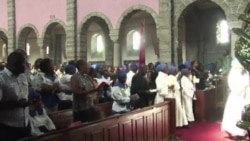Once safe from the taxman’s grip, churches in Zimbabwe are now the target of the country’s revenue office, as it seeks alternative income streams for the cash-strapped government.
The country’s faithful followers of various religions, from Christianity, Islam and other traditional practices, have been thronging places of worship, seeking solace from the economic and social hardships that now confront them.
As they pour out their grief and seek comfort from up above, they give the little money they do have to the church, as tithes but also expectation of something a little more, thus boosting church revenues to unprecedented levels.
This revenue has now become the target of the Zimbabwe Revenue Authority (Zimra), which recently announced its plans to start taxing churches to fill the cash-strapped government’s coffers.
Spokesperson for the Anglican Church, Precious Shumba said the move was concerning, and argued that contrary to Zimra’s thinking, churches are not profit-making businesses.
“Churches are there to facilitate the worshipping of God, so the taxing that has been shared in the media by Zimra officials, they appear to be trying to raise funds for some other expenditure for the government,” Shumba said.
A decade-long economic downturn has left the Zimbabwean government's coffers decidedly lean as it battles to pay civil servants. Earlier this year, Zimra targeted some 300,000 farmers who benefited from the controversial land reform program that forced off many of the country’s white commercial farmers, demanding they pay rent and annual levies.
Economist Prosper Chitambara said the proposed taxing of churches is a desperate move by the government to get revenue from anywhere it can, given its limited options.
“When you look at tax revenues as a proportion of GDP, they have actually gone down quite markedly and this reflects the weaknesses in the economy,” Chitambara said. “We are anticipating that the economy will grow by no more than 2%, so I think it’s a sign of desperation.”
The move comes at a time when so-called gospreneurs – or gospel entrepreneurs – are changing the face of Christianity in Africa. Pentecostal mega-churches attract tens of thousands of followers by preaching a gospel of wealth, while their pastors flaunt lavish, executive lifestyles. Zimbabwe's revenue authority has said the tax authority won't target worshipper offerings, only churches' “income-generating projects.”
Some critics of mega-churches have raised concern over the large amounts of money that faithful worshippers donate, in hopes of getting rich, as promised by some pastors. Zimbabwean Ph.D candidate Maureen Kademaunga, said gospel entrepreneurs are condemning people to poverty with false promises.
“A lot of them [churches] have come up with a lot of spiritual concepts like miracle money and such other things,” said Kademaunga. “And so a lot of people, desperate ones, the poor ones like what Karl Marx said ‘religion is the opium of the masses,’ they go there and take out the last dollar and give to the prophets.”
Many churches defend the money they receive from parishioners, saying all of it goes toward running the church’s affairs, and not fatten the pockets of greedy pastors, as some believe. One opponent of Zimra’s move is Pastor Laban Musasa of the Apostolic Faith Mission Church.
“When we want actually to develop our society, when we build some halls we don't go and beg the money from the government, we collect our own monies we say fundraising,” said Pastor Musasa.
“When you talk of actually taxing that fundraising which is meant for building a building which will add value to the society, those who will be taxing that, as you have said ZIMRA, to me its not conducive.”
Undeterred by the pleas, Zimra plans to start collecting taxes from churches, next year.







